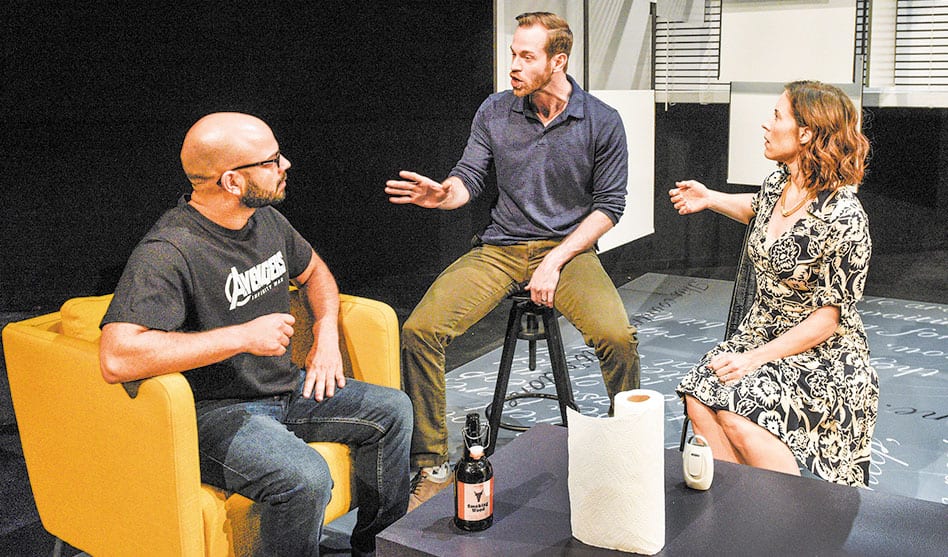Tim (Alex Organ center) explains the dangers of pollution? in ‘Enemies of the People’ (photo courtesy Karen Almond)
‘Enemies/People’ updates Ibsen in the age of fracking
ARNOLD WAYNE JONES | Executive Editor
jones@dallasvoice.com
![]() The town of Hammon, Texas, had been on a slow slide into ghost town for decades when the discovery of hot springs outside of town spurred local politicos, led by the priggish mayor, Peter (Gregory Lush), to borrow heavily so they could open a hotel resort and spa. The economy is on the rebound, and the future looks promising. At least until Peter’s estranged brother Tom (Alex Organ), an urban planner with a troubled past, throws a wrench into the works. On a hunch, Tom hires a scientist to examine the water table whence the “healing waters” emerge, only to reveal they are filled with benzene, sulfides and other carcinogens, likely the result of hydraulic shale fracturing and extraction. Nothing will heal those who book a room here; if they are lucky, some will take 20 years to develop acute myeloid leukemia.
The town of Hammon, Texas, had been on a slow slide into ghost town for decades when the discovery of hot springs outside of town spurred local politicos, led by the priggish mayor, Peter (Gregory Lush), to borrow heavily so they could open a hotel resort and spa. The economy is on the rebound, and the future looks promising. At least until Peter’s estranged brother Tom (Alex Organ), an urban planner with a troubled past, throws a wrench into the works. On a hunch, Tom hires a scientist to examine the water table whence the “healing waters” emerge, only to reveal they are filled with benzene, sulfides and other carcinogens, likely the result of hydraulic shale fracturing and extraction. Nothing will heal those who book a room here; if they are lucky, some will take 20 years to develop acute myeloid leukemia.
Tom, of course, lobbies for construction on the project to halt immediately and further testing be done; Peter says the panic will ruin the town — what’s acquiring non-Hodgkin lymphoma compared to a Club Monaco and two Starbucks on Main Street?
Henrik Ibsen wrote An Enemy of the People more than a century ago, where a doctor in a resort town rang a similar alarm bell; that was long before fracking and Flint, Mich., and climate change made us woke to the environment. And yet nothing is noticeably different.
That’s the point of Blake Hackler’s reimagining of Ibsen, Enemies/People, getting its world premiere from Second Thought Theatre. He’s trimmed the fat (culling the cast by at least half, and updating the background and the language), but the message of social justice hasn’t varied much: One man, standing against a passionate, concerned but misinformed populace, can’t really make a difference, except as an abstraction. It’s both reassuring and depressing to realize how slowly the arc of history bends toward justice. The Man always wins.
Hackler’s smartest move it to set the story in this age of social media and dug-in opinions. Confrontations are Facebook Lived; ad hominem invectives and competing pundits pollute the discussion as much as the water; slow-burn toxins we can’t see or taste don’t matter if the investment pays dividends… at least until the faucets catch fire and children are born sterile and deformed.
And Hackler does another thing I wasn’t quite expecting: He makes Tom kind of a dick. The flawed hero is a trope in modern theater, but Tom is a case-study in ego over outcome. He seems weirdly and overly jazzed at discovering the water table in his small town is poisoned; good liberals don’t usually take such smug satisfaction from accurately predicting a devastating environmental disaster. His motivations are murky, as is his methodology of reporting the news, choosing to sandbag his brother (and his wife, played by Allison Pistorius, who seems irked that he didn’t warn her their drinking water might be contaminated earlier) and let his citizen-journalist friend (Jovane Caamano) leak the results online. Tom’s character seems to be that it isn’t enough to be right; you must also be a jerk about it.
Those are frustrating moments, though they are largely limited to Act 1; in Act 2, the play becomes more interactive, with the audience engaging as the voters of Hammon, raising their hands and offering their opinions about gun violence, immigration, MeToo, Black Lives Matter and trans rights, all cast against the deflective trick of demagoguery. It culminates with so much hectoring from every character onstage, each drowning out the other, that the cacophony is anarchic — nothing can get done, and nobody can be heard, right or wrong. Victory is had by ignorance and obfuscation. Truth is the victim of the faceoff between libtard elites and Trumpian rednecks.
The ending doesn’t quite work; Hackler repeatedly invokes meta-theater, consciously commenting on the play’s roots in Ibsen, and his contemporary twist seems wrong; he drills a well he can’t get out of. But aside from the confusing character choices in Act 1, Organ delivers a fiery performance as Tom, and Christie Vela as a Latina businesswoman torn between her community and her livelihood gets off some juicy bits. The overall message to, literally, “drain the swamp” takes on a secondary meaning; hard decisions become a last resort… and Hammon may construct its last resort, sacrificing its legacy for its comfort. It’s hard to say that wouldn’t happen in real life; it’s happening now.













